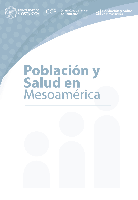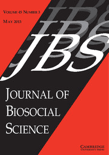
Revista Latinoamericana de Poblacion
metrics 2024
Fostering Insight into Demographic Trends Across Latin America
Introduction
Revista Latinoamericana de Poblacion is a distinguished open-access journal dedicated to the field of population studies, published by the Asociación Latinoamericana de Población. Since its inception in 2007, the journal has aimed to foster scholarly dialogue and disseminate critical research on demographic dynamics across Latin America. With an emphasis on diverse methodologies and interdisciplinary approaches, the journal serves as a platform for researchers, professionals, and students to engage with pressing issues such as migration, fertility, aging, and socio-economic factors influencing population trends. As an invaluable resource for the academic community, this journal not only promotes accessibility to vital research through its open-access model but also plays a crucial role in enhancing the understanding of demographic changes and their implications in the region. By focusing on the unique context of Latin America, Revista Latinoamericana de Poblacion facilitates a deeper insight into population phenomena that resonate globally.
Metrics 2024
 -
- 0.40
0.40 0.40
0.40 -
-Metrics History
Rank 2024
IF (Web Of Science)
JCI (Web Of Science)
Quartile History
Similar Journals

Revista Latinoamericana de Estudios de Familia
Illuminating the Complexities of Family Life in Latin AmericaRevista Latinoamericana de Estudios de Familia is a distinguished academic journal dedicated to advancing knowledge and understanding within the fields of family studies and social sciences. Published by UNIV CALDAS, this open-access journal has been facilitating the dissemination of research since 2009, making its valuable content freely accessible to a global audience. With a commitment to fostering scholarly dialogue, the journal welcomes contributions that explore diverse aspects of family dynamics, relationships, and cultural influences across Latin America. As part of its mission, the journal aims to provide a platform for researchers, professionals, and students to share insights and findings that can contribute to the development of effective family policies and practices. The journal’s open-access model enhances its reach and impact, ensuring that critical research is available to those who need it most. Whether you are an experienced researcher or a budding student, Revista Latinoamericana de Estudios de Familia is an essential resource for those interested in the multifaceted nature of family life in a rapidly changing world.

POPULATION
Navigating the Landscape of Population DynamicsPopulation, an esteemed journal published by the Institut National d'Études Démographiques (INED), serves as a critical platform for the dissemination of high-quality research in the field of demography. With the ISSN 0032-4663 (Print) and E-ISSN 1957-7966 (Online), this journal covers a wide spectrum of topics related to population studies, including migration, fertility, mortality, and population policy, offering a comprehensive lens on demographic trends that influence societies worldwide. Although it operates under a traditional subscription model, its rigorous peer-review process ensures that only the most impactful and relevant research findings are published. With its long-standing reputation among scholars and practitioners in the demographic domain, Population plays a vital role in shaping the academic discourse and guiding future research directions. Scholars, professionals, and students alike will find in its pages not only innovative perspectives but also critical insights that reflect the complexities of population dynamics in a rapidly changing world. For those dedicated to understanding the demographic challenges that societies face today, this journal remains an invaluable resource.

Journal of Demographic Economics
Unlocking the Potential of Population Trends for Economic GrowthThe Journal of Demographic Economics, published by Cambridge University Press, stands as a leading interdisciplinary platform dedicated to the exploration and advancement of research in the intertwined fields of demography, economics, and geography. With an impact factor that reflects its esteemed position—ranking in the Q1 quartile for Demography (2023)—the journal fosters scholarly dialogue through high-quality articles that elucidate the complex interactions between population dynamics and economic trends. Operating under an open access model, the journal ensures that its findings are widely accessible, promoting inclusivity and engagement among researchers, professionals, and students alike. The Journal of Demographic Economics endeavors to bridge gaps in knowledge by publishing innovative and rigorous studies, thereby contributing significantly to both theoretical frameworks and practical applications across various domains. Drawing submissions from a global audience, this journal not only enhances the understanding of demographic transitions but also informs policy decisions and socioeconomic development strategies, making it an essential resource for those invested in demographic and economic research.

Poblacion y Salud en Mesoamerica
Fostering Collaboration for Better Health OutcomesPoblacion y Salud en Mesoamerica is a pivotal open-access journal published by the University of Costa Rica's Centro Centroamericano Poblacion. With an ISSN of 1659-0201 and an E-ISSN of the same, this journal has been dedicated since 2003 to advancing the fields of demography, epidemiology, health informatics, and public health within the Mesoamerican region. Addressing critical health and population issues, it aims to foster a deeper understanding of demographic trends and their implications on health policies. As of 2023, the journal ranks in the Q4 quartile across several categories, reflecting its commitment to publishing quality research while serving as a platform for emerging scholars and seasoned professionals alike. Although it is currently in the lower quartile ranks, the journal seeks to establish itself as a vital resource in the context of Mesoamerican social sciences and health, making it an essential tool for researchers and practitioners interested in regional population health dynamics. Its editorial board is comprised of experts dedicated to enhancing the scholarly conversation surrounding population health and policy in Central America.

JOURNAL OF BIOSOCIAL SCIENCE
Investigating the Synergy of Social Structures and Biological FactorsJOURNAL OF BIOSOCIAL SCIENCE, published by Cambridge University Press, is a pivotal interdisciplinary journal dedicated to advancing our understanding of the complex interplay between biological and social factors in human health and society. With an ISSN of 0021-9320 and an E-ISSN of 1469-7599, this journal has been a cornerstone of scholarly communication since its inception in 1969, paving the way for innovative research until 2024 and beyond. The journal is ranked in the Q3 quartile in Public Health, Environmental and Occupational Health and Q2 in Social Sciences (miscellaneous), reflecting its significant impact in these fields. Its Scopus ranking further emphasizes its relevance, sitting at #79 out of 275 in General Social Sciences and #334 out of 665 in Public Health. Researchers, professionals, and students are encouraged to explore the journal's rich repository of articles that delve into critical biosocial issues, fostering a deeper understanding of how social structures influence health and well-being. Although not open access, the journal remains an essential resource for those committed to addressing contemporary health challenges through a biosocial lens.

Espaces-Populations-Societes
Empowering Research in Geography and DemographyEspaces-Populations-Sociétés is a distinguished journal published by UNIV LILLE I SCI & TECH, focusing on the fields of demography and geography. Established in 1983, this open-access journal has committed itself to providing a platform for innovative research and discussions around population dynamics and spatial organization, with accessibility to its content available since 2004. Based in France, at the UFR Géographie & Aménagement, the journal plays a crucial role in advancing understanding of demographic trends and planning developments. With current Scopus rankings highlighting its position in the 25th and 14th percentiles for Demography and Geography, Planning and Development respectively, it maintains a reputable standing within academic circles, establishing its importance in contemporary research landscapes. Researchers, professionals, and students alike will find valuable insights in its comprehensive overview of sociocultural and environmental interactions, as well as place-based issues at the heart of societal development.

Population Review
Exploring the Dynamics of Population ChangePopulation Review, published by Sociological Demography Press, is a vital resource in the field of demography, contributing to the understanding of population dynamics and trends since its inception in 1988. With an ISSN of 1549-0955 and an E-ISSN of the same number, the journal has played a significant role in disseminating scholarly research and analysis relevant to demographic changes and their implications. Although currently categorized in the Q4 quartile, it ranks 78th out of 139 in the Scopus Social Sciences: Demography category, placing it within the 44th percentile among its peers. This journal serves as a platform for researchers, professionals, and students to engage with contemporary population issues, encouraging the exploration of new theories and methodologies. While not available as open access, its robust editorial standards and commitment to rigorous research make it an invaluable addition to the libraries of demographers and social scientists alike.

Comparative Population Studies
Transforming data into impactful demographic discourse.Comparative Population Studies is an esteemed open-access journal published by the BUNDESINSTITUT BEVOELKERUNGSFORSCHUNG in Germany, dedicated to advancing the field of demography. Since its launch and transition to open access in 2010, the journal has provided a platform for researchers to share innovative population studies, promoting a deeper understanding of demographic trends and patterns globally. With an impressive Q2 rank in Demography within the 2023 quartile categories and a commendable rank #61 out of 139 in Scopus' Social Sciences Demography classification, it plays a vital role in disseminating rigorous research. The journal covers a range of topics related to population dynamics, migration, and social implications, making it invaluable to academics, professionals, and students in the field. With an emphasis on comparative studies, Comparative Population Studies not only fosters scholarly dialogue but also enhances policy-making and economic planning. Located at Friedrich-Ebert-Allee 4, Wiesbaden 65185, Germany, the journal continues to be a prominent resource for those eager to engage with the latest demographic research.

Papeles de Poblacion
Fostering understanding through open-access research.Papeles de Población, published by the Universidad Autónoma del Estado de México, is a prominent open-access journal that has been advancing the field of demography since its inception in 1997. With an ISSN of 1405-7425, this journal aims to foster a deeper understanding of population studies through research articles, reviews, and critical analyses that address the complex dynamics of demographic changes, social structures, and their implications. While currently ranked in the fourth quartile of its category in 2023, it serves as a significant channel for researchers, professionals, and students to disseminate and access cutting-edge findings. Open access since 2004, it provides a platform for broader readership and knowledge sharing, thus contributing to the global discourse on population issues. Based in Mexico, the journal is committed to embracing diverse perspectives, emphasizing the importance of regional studies within a global context.

POPULATION AND ENVIRONMENT
Pioneering Research on Population and Environmental InteractionsPopulation and Environment is a renowned journal published by Springer, focusing on the critical intersection between demographic processes and environmental changes. Established in 1980, the journal has become a leading platform for interdisciplinary research, with its impressive impact reflected in its 2023 rankings, placing it in the Q1 quartile for both Demography and Environmental Science (miscellaneous) categories. With Scopus Ranks highlighting its prominent position (#11 out of 139 in Social Sciences – Demography, and #46 out of 219 in Environmental Science), Population and Environment fosters a rich dialogue among researchers, professionals, and students dedicated to understanding how population dynamics influence environmental conditions and vice versa. Operating without an open access option, the journal ensures high standards for scholarly contributions and remains committed to bridging knowledge gaps in the realms of population studies and environmental science. The journal's rigorous peer-review process and comprehensive archive from 1980 to 2024 solidify its reputation as an invaluable resource for advancing research and informing policy in these critical fields.